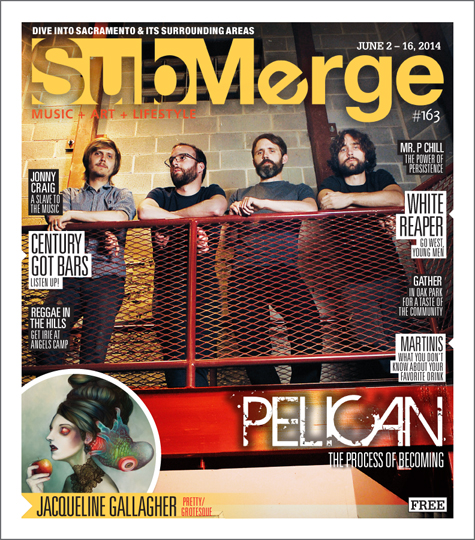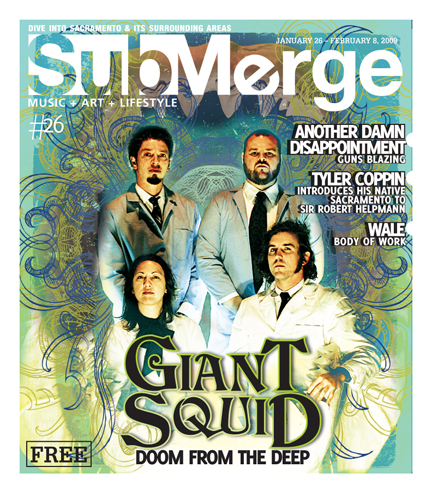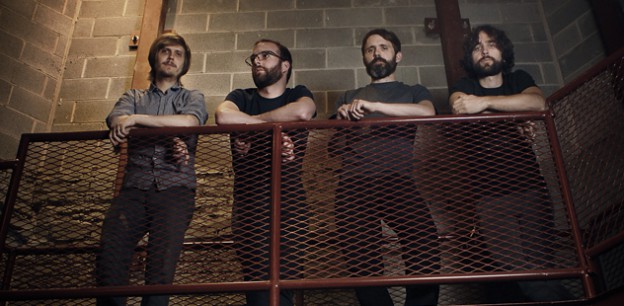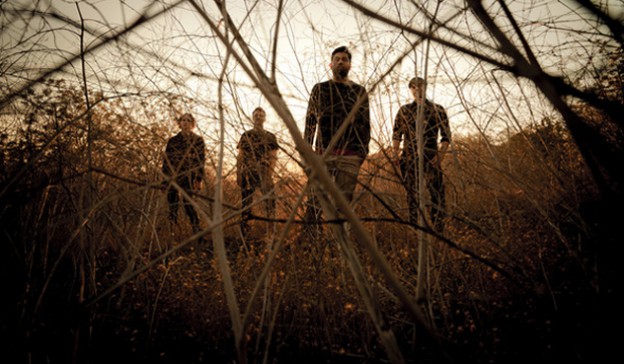Through Many Changes, The Quality of Pelican’s Music Remains Constant
Since 2000, Pelican have planted a sturdy foothold into the soil of the independent music landscape. With sounds ranging from deep, atmospheric meditations to abrupt bursts of sonic onslaught, the mostly Chicago-based quartet have covered considerable ground since their inception and release of head turning debut EP in 2001. The dynamic and devastating track “Mammoth” reeled in listeners with its methodical, detuned open guitar riffs and bashing of crash cymbals, setting the tone for what would become a mighty career. They followed up with their debut full-length, Australiasia, which fortified their presence and quickly made them a household name—in cool households, anyway.
Expanding on their early career success, the group released their second full-length, Fire in Our Throats Will Beckon the Thaw. While still containing earth-shaking riffs, this record took a turn toward a more ethereal plane. “Autumn Into Summer” and “Aurora Borealis” would feature long, reverb-laden, delayed guitar segments, which provided a more ambient atmosphere, compared to that of their previous works. Meanwhile, 2007’s City of Echoes contained eight songs, all seven minutes or less; songs were becoming a bit more straightforward and chugged along like a steady locomotive train. This record defined a slight change in the group’s sound, and was also the final album put out on Hydra Head Records. In 2009, Pelican signed to Southern Lord Records and put forth their first effort, What We All Come to Need. Change and growth can be found within. At that point, Pelican had already made their mark with a signature sound of blending alluring harmony with mashing might. “The Creeper” takes you on a sonic ride of twists and turns. The swelling, distorted guitar from the introduction shifts to a glorious glide and then flares into uplifting triumph.
For the band’s fifth and most recent full-length, Forever Becoming, the pace have remained steady; with new guitarist Dallas Thomas in tow, the successful formula Pelican has adhered to remains present, but less space is wasted.
Submerge had the great fortune of catching up with guitarist and founding member Trevor de Brauw to discuss change, conditions and much more.

How have the times changed since the release of your debut EP?
We have gone through many changes over several phases of the band. When we released that EP, Pelican was a hobby and a side project to a band that Larry [Herweg], Laurent [Schroeder-Lebec] and I were doing called Tusk. We were writing Pelican songs on the side and then the band began to resonate with people, took on a life of its own and introduced music to us as much more than a hobby. There was a point where the band grew faster than we had anticipated and it became a professional aspiration; we were glared with the opportunity to pursue it almost like a job. Pelican became our bread and butter. Now we play purely for pleasure and for a creative pursuit, which is much more coherent.
Were you constantly touring earlier in your career and have you stepped back from that in recent times?
In the beginning it was very fun. We toured continuously from 2005 to 2009 for about four months out of the year; we treated it like a profession for several years and then hit a wall. The band took off for us when we were around 27 years old, when most people are settling down. As you get older, you start to ask questions like, “What am I doing with my life?” or, “What am I going to do when this dries up?”
The only way to sustain a living off of music is to spend an inordinate amount of time on the road, but none of us were really wired for it, so we stepped away. We then took stock of the band and tried to figure out a way to straddle the difference between the two periods where we knew it was more than just fun, but where it wasn’t the primary focus. We knew we had to rely on other ways to make ends meet.
Has getting older had an effect on what you’re doing now?
Before we didn’t have perspective on what was happening. When you’re constantly involved, it’s hard to step back and see the bigger picture. We were in a whirlwind and weren’t really aware of our surroundings or how precious everything was. Now we have a greater sense of responsibility for our music and our art that we can only approach when we have the time to do so, which is both limited and special.
Do you see yourselves as trendsetters?
I don’t know if we’re trendsetters. There was a natural thing that happened around 2004 or 2005 where a bunch of instrumental bands from disparate scenes caught the public notice and didn’t necessarily inspire a trend, but it raised consciousness of a style that could be pursued in the indie-sphere. Instrumental music came before us and will happen after us, but I don’t think it was or will ever be trendy.
Fugazi didn’t sell merchandise on the road. Is this something you can even imagine?
No. We have to make ends meet to justify the expense of going on tour and one of the ways we do that is by selling merchandise. I love Fugazi and their ethics. They existed at a time when they were able to make that work in a courageous and awesome manner, and I completely respect them, but it would be nearly impossible for a smaller band like us to maintain that due to financial burdens.
How was the transition from Hydra Head Records to Southern Lord?
It was good. Both labels are artist-run with Greg Anderson [Goatsnake] and Aaron Turner [Isis] being musicians from similar backgrounds within heavy and experimental music genres. There is a great understanding about where the artists are coming from. We felt like we’d done so much with Hydra Head and wanted to see what working with other labels felt like, so we checked out Southern Lord. With Hydra Head, we felt like we were part of a cult; so many of our friends were forged because they were label mates or tour mates, but the label was pretty free flowing and artistic. There’s less of a familial atmosphere with Southern Lord mainly due to the fact that they put out more music, but they’re more on top of the business side of things. It’s nice to be on a label that has all their t’s crossed and i’s dotted.
Did you learn anything new when writing and recording Forever Becoming?
For a long time we were crowding every inch of our music; we were taking up all of the space with a lot of notes. We learned how to build on what we’d done on the previous two albums by writing more progressive music, but making our music more spacious. Our newer music has less of a fatiguing feel due to the music being less crowded with notes.
Do you find it to be more unique playing abroad than in the United States?
I think it’s a different experience performing in city to city everywhere. That’s part of the appeal. One of the concepts that drove City of Echoes was that even though every place is different, there is a common love of music that bonds everything together. Music is an international language.
Are there any new bands or records you’re excited about?
This band called Nothing that we recently played with has a new record out on Relapse that is really great. I was able to check out the new Tombs album coming out in June and it sounds good. I don’t tend to get too stoked about metal, but there are a lot of bands releasing albums this year within the genre that I’m getting excited about.
Do you listen to any music that your fans might be surprised about?
As of recently, I started obsessing over a Weezer song from Raditude called “Can’t Stop Partying (Polow Version).” It’s produced by Jermaine Dupri, and has a vocal verse by Lil Wayne, which is bizarre because on the surface it seems like a typical club banger, but it’s in a minor key and the intonation in Rivers Cuomo’s voice is so desperate and dark. If you think about the title, it’s not a good thing. It seems he’s referring to partying as an addiction, so he’s glamorizing this partying lifestyle, but it’s a dark hole that can’t be escaped. Pelican fans might not assume that I’d be pondering over songs produced by Jermaine Dupri, but lately I’ve been thinking about this track a lot.
Pelican will play live in Sacramento with Tombs on June 16 at Midtown Barfly. Tickets are $12 and can be purchased in advance through Facebook.com/pelicansong.

Chino Moreno is a busy dude. Not only does he front the always busy and internationally huge rock band Deftones, last year he released an EP with his Crosses project (featuring Shaun Lopez of Far and Chuck Doom) and joined a newly formed band called Palms with three members of now-defunct post-rock group Isis (drummer Aaron Harris, guitarist/keyboardist Clifford Meyer and bassist Jeff Caxide). On April 1, 2013 Harris posted on his blog (Aaronharris-audio.com) that the debut Palms record had been completed and handed over to the their label, Ipecac Recordings, for a June 25, 2013 release date. “I couldn’t be happier with both the experience of creating this album and how it turned out.” In early March, Harris met up with Deftones on tour so that he and Moreno could wrap up vocals for the record. “We turned hotel rooms and backstage areas into temporary recording studios,” Harris wrote.
As of press time, Submerge was able to find one song online after searching around a bit. We think it’s called “Tropics,” and it’s way more mellow than one might expect when thinking about Isis meets Deftones. We look forward to hearing the whole record and hopefully a Sacramento tour date (hint, hint, Ace of Spades).
Church Underwater
The ocean is home to the world’s largest creatures. One of the most fascinating of these mammoth beasts is the giant squid. Rarely photographed, its elusiveness belies its ponderous size. As a result, the mysterious creature has inspired folklore, myth and art worldwide. It is fitting that such a beast would serve as the moniker for San Francisco-/Sacramento-based metal band Giant Squid. Titanic in sound, Giant Squid is difficult to categorize. Though the band leans heavily on the tenets of doom/stoner metal popularized by groups such as Isis—riffs are heavy, thick, slow and hypnotic and paired with wailing vocals laden with despair—Giant Squid pushes the avant-garde metal envelope even further, tossing in atmospheric keys, horns and strings into the mix. This strange sonic brew made the group’s debut full-length, 2006’s Metridium Fields, a noteworthy release for underground metal fans. On Feb. 3, Giant Squid may extend its reach even further with the unveiling of their latest album, The Ichthyologist.
Weirder, heavier and deeper than the group’s previous efforts, The Ichthyologist is a sort of heavy music kaleidoscope. Considered separately, the songs seem to share little in common with one another: The jazz-y “Sutterville” sways like a drunken zombie lounge singer; while the opener “Panthalassa” starts with a sinewy, serpentine guitar line that snakes into a wall-squalling metal noise. Yet, when listened to as a whole, these disparaging colors form a mesmerizing picture.
A portion of the album’s success should be credited to the man turning the knobs. In-demand heavy music producer Matt Bayles, who has worked with the aforementioned Isis as well as Mastodon in the past, served as producer for The Ichthyologist. According to Giant Squid singer/guitarist Aaron Gregory, the band, without the backing of a label, pooled its resources to pay Bayles’s considerable price tag.
“Everyone in the band chipped in their savings and then some,” Gregory says. “We sold some gear, and we finally got around to putting the rest of our Monsoon EPs online, and made some money off of those real quick. We managed to do it somehow. We put together a really large sum of money and hired him.”
It was money well spent. During our interview, Gregory refers to Bayles as a “taskmaster,” but says he appreciated the producer’s strictness.
“He really whipped us into shape, and made us make sure we play every note to the best of our ability, or he wouldn’t let it go,” Gregory recalls. “It’s one of the first records I’ve walked away from and said, ‘I’m pretty much OK with every single thing I did on that record.'”
The Ichthyologist‘s cohesiveness may also be attributed to its concept. The album coincides with Gregory’s first, yet-to-be-completed graphic novel by the same name. Gregory says that the comic book version of The Ichthyologist is, in part, inspired by The Swamp Thing. “I love the idea of a man becoming something so much more than a man, and yet kind of less than a man, and the spiritual heaviness of Swamp Thing, especially when Alan Moore started writing it,” Gregory says of the classic DC Comics character.
Gregory, a professional SCUBA diver working at San Francisco’s Aquarium of the Bay, discussed the audio, visual and philosophical aspects of The Ichthyologist in a recent interview.

You’re self-releasing The Ichthyologist in a limited run of 1,000 copies. What made you decide to take that route with the album?
We spent an incredible amount of money to work with Matt Bayles, and we’re maybe not the caliber of band yet that could get a label to pay us right upfront enough money to hire Matt Bayles. Honestly, I doubt most labels would be able to give us half of the advance we would need to work with Matt. Because we did it for ourselves, we wanted to make sure that we didn’t give this album away to a label for nothing and we all kind of lose our ass. In all reality, you don’t see hardly any money back from small labels. That’s just part of it. That’s fine too, because they work their ass off and they have bills to pay too. In this way, if we sell a thousand of them at 12 bucks a pop, we get all of our money back. We get to break even. We’re at the level that we can do that on our own, for sure. The pre-sales are already exploding. We sell a shit-ton of them every day. Hopefully when all is said and done, we would have signed a new label deal or two, six months after the release, it’s our goal to find someone to put it out on vinyl and put it out on CD.
I’ve read that The Ichthyologist is based on a graphic novel that you’re working on. Would you like to talk about that?
Yes, the album is based on a graphic novel I’m writing that goes by the same name. The protagonist has lost it all in haphazard ways and takes on the abilities of a sea star to survive it, and thus begins this huge journey, that no matter what happens he ends up healing, because sea stars have this regenerative ability. The album is basically the poetic description of my character’s origin. It’s the poetic downfall from the beginning to the end of his origin. The graphic novel goes much, much more past that.
Did you know that you wanted to tell this story both musically and as a graphic novel, or were you not sure?
I came up with the album title first. I thought that would just be a great album name, The Ichthyologist. It’s perfect for me—perfect for Giant Squid. Then I was talking to someone in the comic book industry, a good friend of mine, about some ideas to pitch for the company he works for, which led me to this concept, under the same name. The songs had already been written, and I worked the general themes of those into the story. There’s a song on there called “Mormon Island,” which is a very old gold mining town in the Sacramento area that’s long since gone and is now actually sitting at the bottom of Folsom Lake. We were writing this very creepy song, and someone said that it sounded like a church underwater, and I was like, “Shit, I know where there’s a church underwater. There’s a church at the bottom of Folsom Lake, a town called Mormon Island. We’ve got to call this song ‘Mormon Island.'” Then I was like, “How can I work Mormon Island into the story?” And by doing so, it opened up all these different angles into my story. So, as I’m writing the graphic novel, writing the album helped inspire a lot of different things, and vice versa. There would be ideas, right from the get-go, like, “I have to write a song about this moment in the dude’s creation, this moment in the guy’s downfall,” and so on.

Looking at the other titles on the album, there’s one that mentions the Donner Party; and Ernst Haeckel, whose image you used on the cover, has a peak named after him in the Sierra Nevadas. There’s also a mention of the La Brea Tar Pits. I don’t know if it was intentional, but the album seems to have a very firm sense of place. It’s very Californian.
Absolutely. I’ve always been obsessed with California history, and have incorporated it in a lot of ways, sometimes more subtle than others, in all our albums. We also had a 7-inch called “Sutter’s Fort,” and there’s a sequel to “Sutter’s Fort” on The Ichthyologist called “Sutterville,” which is more or less about Sacramento refusing to give up its capitol-ship. Sacramento kept flooding in the 1800s, and people kept saying, “You need to move your capitol. This is a pretty shitty fucking place to have a capitol.” And Sacramento refused to give it up, and after huge bouts of cholera and death and that kind of shit, they just raised all the streets 10 feet in the air. The actual story of The Ichthyologist is time-hopping as well.
There’s a mix between the human history of California and the natural history as well. Does working in marine biology allow you to see the scope of both? I would imagine being underwater, you can see how the Earth grew up out of it.
You know, not to get too heady, but when you’re 40 feet down at the bottom of the ocean in Monterey and you’re surrounded by kelp and a rocky reef and tens of thousands of fish swimming around”¦you are basically staring right at the godhead. You’re staring at the spiritual center of it all. As far as our planet goes, it all came from right there. You also never have felt like you belong as much as you do when you’re down there. It’s a very strange and surreal sense. It opens up a lot of spiritual thought and philosophy, and who we are in the grand scheme of things. The album is a little heady in some ways, because it does touch on stuff like that. The grand result of the graphic novel kind of deals with that—God being underwater. People go into the seas to talk with God.









